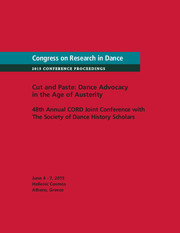No CrossRef data available.
Article contents
Becoming an Egg Or: Migrating Body Parts in Some Works by William Forsythe
Published online by Cambridge University Press: 04 January 2013
Abstract
William Forsythe has remarked that the forms of ballet exist as a body of ideas. Gilles Deleuze and Félix Guattari write in A Thousand Plateaus that the body without organs is not an enemy organism but rather is another organization of the organs. The paper goes on to discuss isometry, transfer of energy, and anatomical migration and the concept of migration as a metaphor in the context of various historical discourses about the body.
- Type
- Research Article
- Information
- Copyright
- Copyright © The Author(s) 2007
References
Notes
I want to thank Dana Caspersen, Dietrich Krüger, Liz Waterhouse, and Niels Lanz from the Forsythe Company for helping me during the research and preparation of this lecture. I also want to thank Nik Haffner and Tony Rizzi for supporting me. I especially want to thank Freya Vass-Rhee, not only for supporting me but for making it possible to join this year's CORD. Without her invitation as panel organizer, I would not have been here.
1. Lepecki, André, “On Dance and Philosophy,” Drama Review (Summer 2007): 120.Google Scholar
2. Deleuze, Gilles and Guattari, Felix, “How to Make Yourself a Body without Organs,” in A Thousand Plateaus (Minneapolis: University of Minnesota Press, 1987), 164–65.Google Scholar
3. Ibid., 159.
4. Ibid., 153.
5. Caspersen, Dana, “It Starts from Any Point: Bill and the Frankfurt Ballet,” Choreography and Dance 5, no. 3 (2000): 24.Google Scholar
6. “Forsythe on Movement Alphabets,” Dance Australia (August/September 2001): 44.
7. Deleuze and Guattari, “How to Make Yourself a Body without Organs,” 158.
8. Ibid., 164.
9. Caspersen, “It Starts from Any Point,” 27.


